Understanding Capital Gains Tax and Its Types Capital gains tax is one of the intimidating subjects for many, especially newcomers who are venturing out into the investment concept. However, knowing how capital gains tax works and its types will always help anyone looking forward to investing in properties, stocks, and, for that matter, mutual funds. It forms the most important part of individual finance in India, directly associated with the profit an investor makes by selling his assets. Capital gains tax is explained along with types of capital gains, and how they affect your investments. We aim at easing the subject so that one can understand better and plan to manage and reduce liabilities.
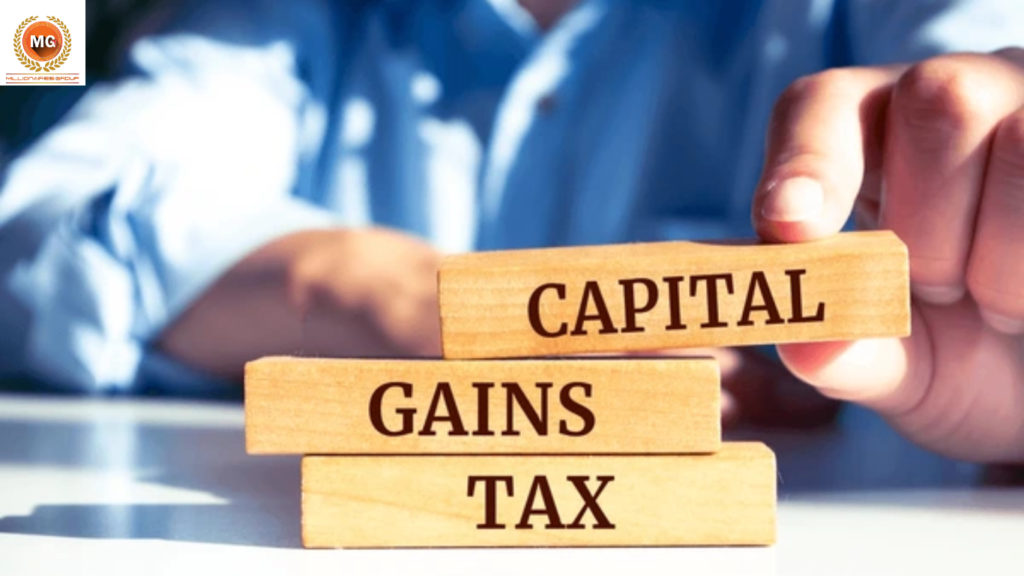
What are Capital Gains Taxes?
Capital gains can be referred to as the income that a firm or individual could realize from selling a capital asset at a more positive value than it had purchased. A capital asset is real estate, stocks, bonds, mutual funds, gold, jewelry, and other valuable commodities that can sell for more than its purchase price. For example, the income you realize from selling an asset attracts a type of tax known as capital gains tax.
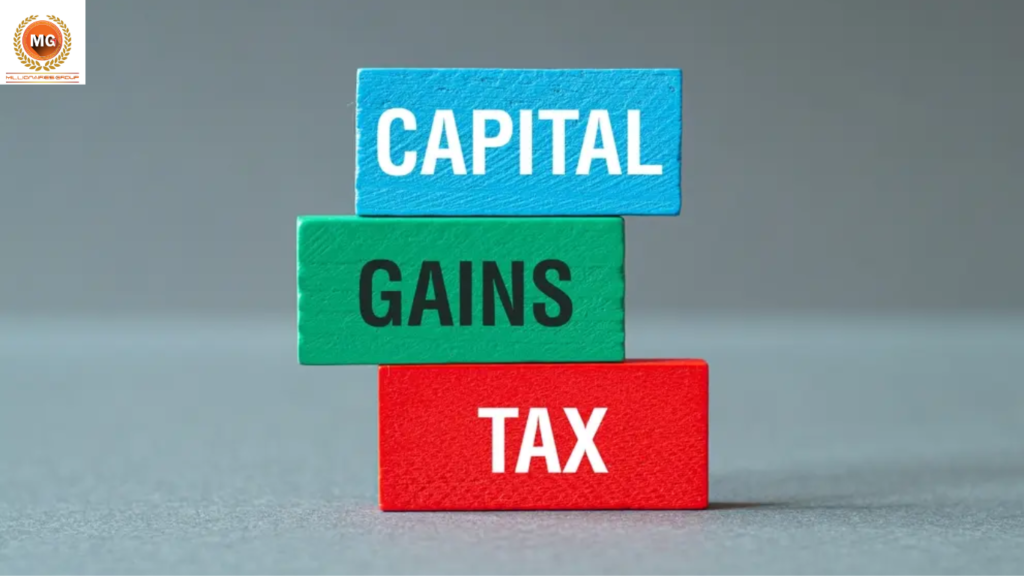
Why is capital gains tax important?
Capital gains tax is also an important source of revenue for the government. It also plays a crucial role in encouraging investors to look into the holding period of the investment, as the tax rate depends on the ownership duration of the assets. Keeping oneself updated about the capital gain tax structure will help make effective decisions and plan well while investing to maximize one’s returns without violating any tax laws.
Types of Capital Gains
Capital gains are divided into two types, namely short-term capital gains and long-term capital gains. The distinction derives from the period of holding an asset before selling it.
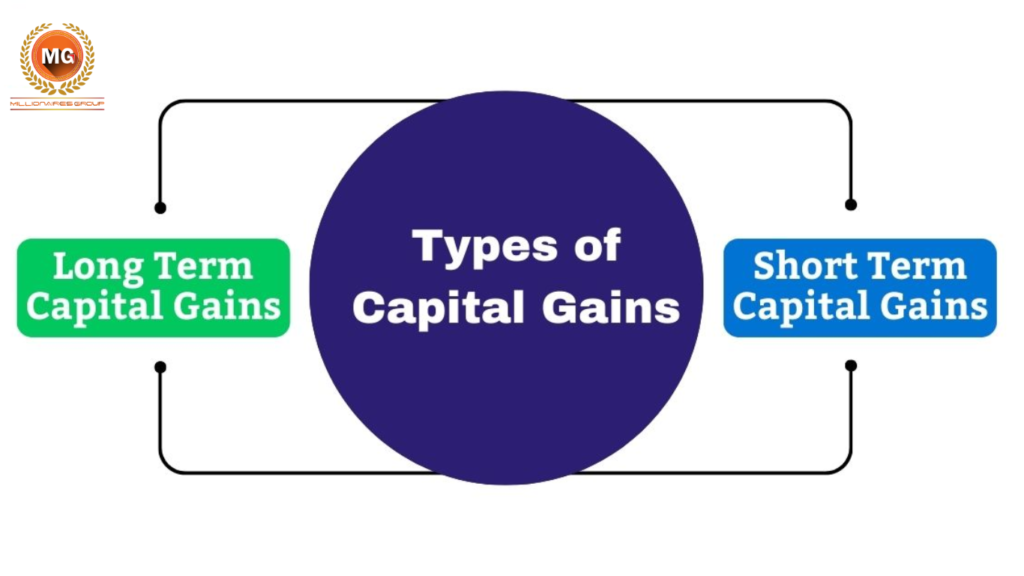
1. Short-Term Capital Gains (STCG)
Short-term capital gains occur whenever you sell an asset shortly after purchasing it. The definition of “short term” varies, depending on the type of asset:
- Equity Shares quoted in the Stock Market and Equity-Linked Mutual Funds: They are STCG if they are disposed of within 12 months after purchase.
- Immovable Property (including land or building): This is an STCG if sold within less than 24 months from its acquisition date.
- Other assets such as gold, jewels, or debt funds: The short term will be less than 36 months.
Short-term capital gains are taxed at a higher rate than long-term capital gains, which we will discuss further.

2. Long-Term Capital Gains (LTCG)
Long-term capital gains are the gains from assets that have been held for a period of more than one year before their sale. This is how the holding period works:
- Equity Shares and Equity-Oriented Mutual Funds: More than 12 months
- Immovable Property: More than 24 months
- Other Assets: More than 36 months.
In general, the tax rates on long-term capital gains are lower than for short-term capital gains. It is attractive for those investors who have the willingness to hold their assets for extended periods of time.
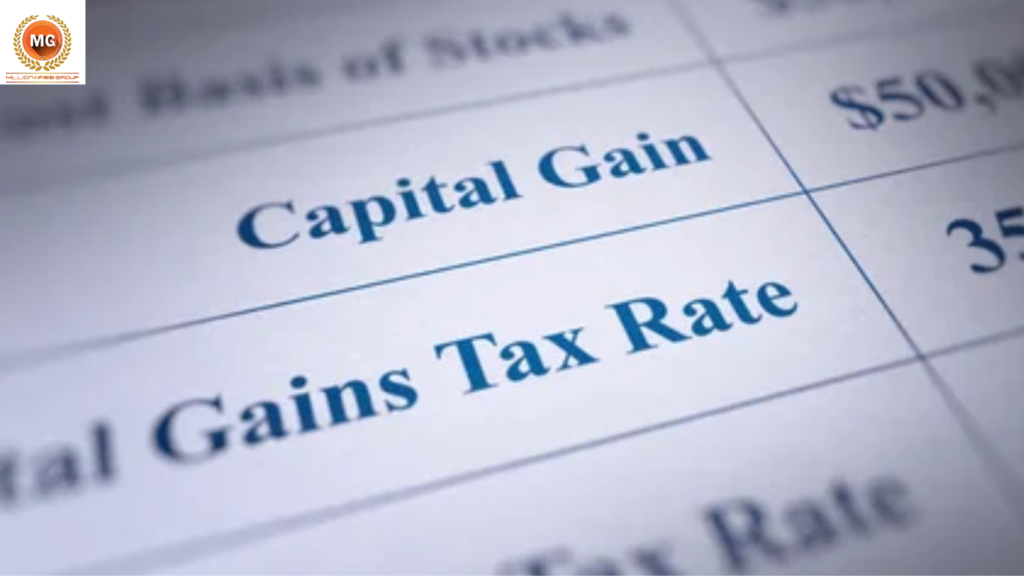
Capital Gains Tax Rates
The rates are different for short-term and long-term capital gains :
Short-term capital gains tax rate: For equity shares listed on the stock exchange and for equity-oriented mutual funds, the short-term capital gains tax rate is 15%. For any other type of asset, the short-term capital gains are added as per the income tax slab that is applicable to the respective taxpayer.
Long-term capital gains tax rate: LTCG beyond ₹1 lakh is taxed at 10% without indexation benefits for listed equity shares and equity-oriented mutual funds. For immovable property, gold, and other assets, the LTCG tax rate is 20% with indexation benefits.
What is Indexation?
Indexation is the process of indexation, which is a method to bring an asset’s purchase price into alignment with respect to inflation. It thus reduces the taxable capital gains, thereby leading to a decrease in tax liability. Indexation applies to most long-term capital assets except listed equity shares and equity-oriented mutual funds.

Calculation of Capital Gains Tax
You need acquisition cost, improvement cost, and sale price to calculate capital gain. The simple formula given is as follows:
Capital Gains = Selling Price – (Cost of Acquisition + Cost of Improvement + Expenses on Transfer)
Calculate Your Short-Term Capital Gains
You have purchased some shares for ₹50,000 and sold those shares after six months for ₹70,000. The short-term capital gains would be:
Capital Gains = Selling Price – Purchase Price
Capital Gains = ₹70,000 – ₹50,000 = ₹20,000
As it is an STCG on listed equity shares, the tax rate would be 15%, and so the tax will be ₹3,000 or 15% of ₹20,000.
Calculation of Long-term Capital Gains with Indexation Example
You can index the purchase of land bought in 2010 for ₹10,00,000 and sold in 2023 for ₹30,00,00,000 to reduce the amount paid as capital gains tax:
Here are the steps on how to apply the Cost Inflation Index given by the government for each year to compute the indexed cost of acquisition and then apply the CII to compute the capital gains:

Capital Gains Tax Exemptions
There are quite a few exemptions that aim to encourage investment in particular assets. Examples include:
Section 54: This is when a capital gain arising from the sale of a residential property is invested within a particular period of time in another residential property. Capital gains tax exemption is claimed.
Section 54F: This relates to capital gains arising from the sale of other non-residential assets.
If the sale proceeds of a non-residential property are invested in purchasing a residential house, you can claim an exemption under Section 54F if certain conditions are complied with.
Section 54EC – Investment in Bonds
Another way to be exempted from capital gains taxation in India is by investing in special bonds issued by the government under Section 54EC. Such an investment must be made within six months after the sale, and ₹50 lakh is the maximum limit for this exemption.

Process for Capital Gains Tax Filing in India
Capital gains tax filing is a part and parcel of ITR income tax return. You will declare your capital gain while filling out ITR 2 with the form in case you are an individual or HUF having capital gain income.
Document Required: All kinds of records regarding the capital assets including purchase price, improvement costs, and sale prices.
ITR form: You have to file ITR-2 because it is specifically designed for both the individuals and HUFs, who have a capital gain.
Due date: The due date of ITR for most taxpayers is July 31st. However, depending upon any further announcement by the Income Tax Department, this due date can be different.
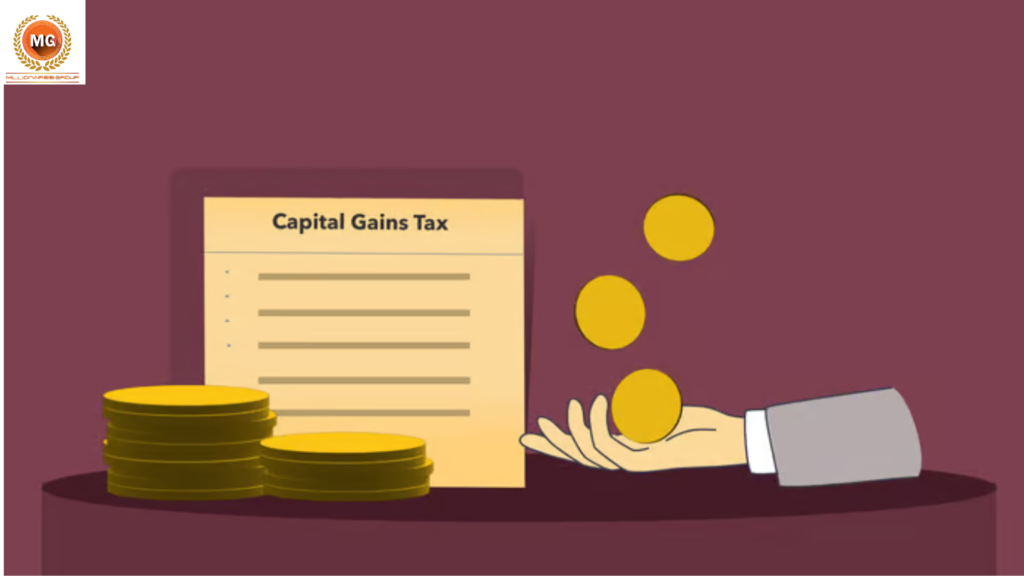
How to Minimize Capital Gains Tax Liability
Here are a few options through which you might lessen your capital gain tax liability:
Hold Assets for More Time: Long-term capital gains are taxed at lower rates; thus, consider holding assets for the minimum required duration.
Re-invest in Real Estate: Sections 54 and 54F have tax exemptions if you re-invest in real estate.
Invest in 54EC Bonds: The bonds issued under Section 54EC permit you to postpone tax on long-term capital gains.
Utilize losses to offset gains: If, during a particular financial year, you incur losses, you will have the opportunity to offset such losses against your capital gains. This reduces the amount subject to tax.

Impact of capital gains tax on investment decisions
This understanding of capital gains taxation will also factor into your investment decisions. In fact, it’s a key consideration when selling an asset. Understanding whether to hold or sell could mean the difference between maximization of profitability and tax liability.
Properly planned, including holding on for longer periods, which allows for preferable tax treatment or reinvestment in tax-exempt avenues, can really help you prudently manage your investments.
Knowing about capital gains tax is the most critical part of financial planning in India; getting an understanding of what capital gains are, tax rates, exemptions, and how to calculate and file this tax could be useful in making all the right decisions with your investments. Be it a sale of property, stocks, or even any other kind of mutual fund, when you know about tax implications, you can increase returns and minimize liabilities. Remember that strategic planning will save you more money in taxes when it comes to capital gains and better accumulating your wealth.
Capital gain tax impact on investments will enable you to work for better financial planning, eventually going towards greater financial freedom.
FOR A FREE STOCK MARKET SEMINAR VISIT HERE
CALLS @ 9986622277
Disclaimer
The information provided here is for general informational purposes only and should not be construed as financial advice. Investing in the stock market involves inherent risks, and there is no guarantee of profits or protection against losses. Before making any investment decisions, it is essential to conduct thorough research and seek advice from a qualified financial advisor or professional.
